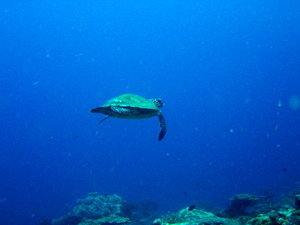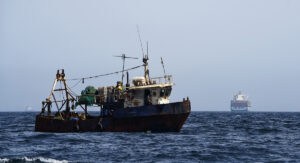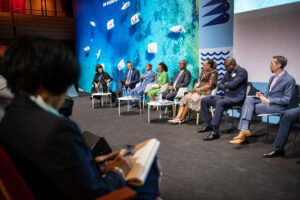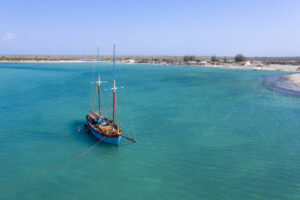The development of a countrywide conservation plan for threatened marine turtles is the focus of a national workshop taking place in Madagascar’s capital, Antananarivo, this week.
Madagascar’s vast coastline and territorial waters provide habitat for five species of marine turtle, all of which are included on the IUCN Red List of endangered species. Threats to these increasingly rare animals include direct targeting by fishermen, raiding of nests for eggs, and accidental capture in commercial fisheries.
Madagascar is a signatory to the Indian Ocean and Southeast Asian Marine Turtle Memorandum of Understanding (IOSEA), an international agreement that aims to conserve marine turtles and their habitats in the Indian Ocean and South-East Asian region. Among other roles, IOSEA offers technical support for the elaboration and application of a region-wide conservation plan for marine turtles.
Sponsored by IOSEA and organised by Madagascar’s national environmental research agency, the Centre National de Recherche sur l’Environment (CNRE), and the non-governmental organization Blue Ventures, this week’s landmark meeting has been convened to review the status of the country’s turtle populations, and to promote collaboration among the agencies working to conserve these threatened animals around the island.
The workshop brings together community leaders, fisheries managers, marine scientists, fishermen, conservationists and government representatives to develop a national conservation and management plan for Madagascar’s turtles.

Critically endangered Hawksbill Turtle ©Al Harris/Blue Ventures
“Never before have representatives of so many sectors come together for turtle conservation in this country”, said Christian Ralijaona, Secretary General of the Ministère de l’Enseignement Superior et de la Recherche Scientifique (MESUaPRES). “This is a pivotal event for turtle conservation in Madagascar which will have consequences for these animals throughout the Indian Ocean. The Malagasy people can be proud to have taken this important step.”
Non-governmental organisations make an important contribution to turtle conservation in Madagascar, through their work with local communities and field studies. Recent research published by Blue Ventures in the journal Animal Conservation revealed that up to 16,000 endangered turtles are being caught each year by villagers in just one region of Madagascar.
“Madagascar is vitally important for marine turtles of the Southwest Indian Ocean”, said IOSEA Coordinator, Douglas Hykle. “Its coastal areas serve as feeding grounds for loggerhead turtles that nest in South Africa and migrate across the Mozambique Channel. Traditional harvests of turtles in Madagascar could jeopardise the health of these shared populations unless steps are taken to ensure that they are conducted sustainably.”
The 3-day workshop reached consensus on the issues considered to be the highest priorities for attention and recommended the creation of a national network to coordinate the work of all of the organisations concerned with turtle conservation in Madagascar.
About Blue Ventures
Blue Ventures is an award-winning marine conservation organisation, dedicated to working with local communities to conserve threatened marine environments. Our highly acclaimed conservation programmes work with some of the world’s poorest coastal communities to develop conservation and alternative income initiatives to protect biodiversity and coastal livelihoods. The results of our work help us to propose new ideas to benefit coastal communities everywhere.
For more information about Blue Ventures’ expeditions, please see http://blueventures.org/expeditions.html
For more information about Blue Ventures’ conservation work, visit http://blueventures.org/research.html
Vers un plan national pour la conservation des tortues marines à Madagascar
L’élaboration d’un plan de conservation dans tout le pays pour les tortues marines menacées est le thème d’un atelier national qui s’est tenu cette semaine à Antananarivo, la capitale de Madagascar
Le vaste littoral de Madagascar et les eaux territoriales fournissent de nombreux habitats pour cinq espèces de tortues marines, inscrites sur la Liste Rouge des espèces menacées de l’UICN. Les menaces qui pèsent sur ces animaux de plus en plus rares incluent la chasse pour la viande, la collecte des œufs et la capture accidentelle par les pêcheries.
Madagascar est signataire de l’IOSEA, un accord international qui vise à la conservation des tortues marines et leurs habitats dans l’océan Indien et le Sud-Est asiatique. Entres autres, l’IOSEA offre un soutien technique pour la définition et l’application d’un plan de conservation régional pour les tortues marines.
Financé par IOSEA, cet atelier national est organisé par le Centre National de Recherche sur l’Environnement (CNRE) de Madagascar et l’organisation non gouvernementale Blue Ventures. Cette rencontre historique doit permettre d’examiner l’état des populations de tortues du pays, et de promouvoir la collaboration entre les organismes œuvrant pour la conservation de ces animaux menacés.
L’atelier a réuni des dirigeants communautaires, les gestionnaires des pêches, des biologistes marins, les pêcheurs, les écologistes et les représentants du gouvernement qui auront contribuer à élaborer un plan national de conservation et de gestion des tortues de Madagascar.
«Jamais auparavant les représentants de nombreux secteurs ne s’étaient réunis pour œuvrer pour la conservation des tortues dans ce pays”, a déclaré Christian Ralijaona, secrétaire général du Ministère de l’Enseignement Supérieur et de la Recherche Scientifique (MESUPRES). “C’est une étape importante pour la conservation des tortues à Madagascar qui aura des conséquences pour ces animaux dans tout l’Océan Indien. Le peuple malgache peut être fiers d’avoir franchi cette étape importante. ”
Les organisations non gouvernementales et les institutions nationales apportent une contribution importante à la conservation des tortues à Madagascar, à travers leur travail avec les communautés locales et les études sur le terrain. Des recherches récentes publiées par Blue Ventures dans la revue Animal Conservation a révélé que jusqu’à 16.000 tortues en voie de disparition sont capturés chaque année par des villageois dans une seule région de Madagascar.
«Madagascar est d’une importance vitale pour les tortues marines de l’Océan Indien Sud-Ouest”, a déclaré le secrétaire général de l’IOSEA, Douglas Hykle. “Ses zones côtières servent d’alimentation pour les tortues caouannes qui nichent en Afrique du Sud et migrent à travers le canal du Mozambique. La captures des tortues à Madagascar pourrait mettre en péril la santé de ces populations partagées si des mesures ne sont pas prises pour s’assurer que ces prélèvements ne sont pas réalisés de façon durable. ”
L’atelier de 3 jours a fait émerger un consensus sur les questions considérées comme prioritaires et a recommandé la création d’un réseau national pour coordonner le travail de tous les organismes concernés par la conservation des tortues à Madagascar.






















